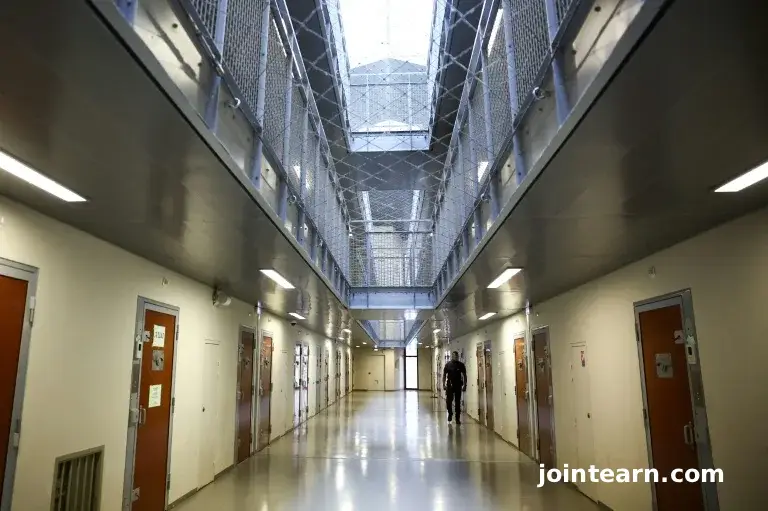
In a historic first for the European Union, former French President Nicolas Sarkozy has been incarcerated, asserting his innocence as he entered Paris’s La Santé prison on Tuesday. Sarkozy, who led France from 2007 to 2012, was convicted last month of criminal conspiracy related to attempts to secure illegal funding from Libya’s late leader Muammar Gaddafi for his presidential campaign.
Sarkozy Enters Prison Amid Supporters’ Outcry
AFP journalists observed the 70-year-old former president leave his home in Paris, flanked by police escorts on motorbikes, before entering La Santé prison. Shouts from inmates such as “Welcome Sarkozy!” and “Sarkozy’s here!” greeted him upon arrival.
In a defiant social media post during his transfer, Sarkozy proclaimed his innocence, writing: “It is not a former president of the republic being jailed this morning, but an innocent man. I have no doubt. The truth will prevail.”
Sarkozy was sentenced to five years in prison in September for orchestrating a plan in which Gaddafi’s Libya would allegedly fund his victorious 2007 campaign. While he has appealed the conviction, the former president said at the time he would “sleep in prison — but with my head held high.”
Public Reaction and Legal Process
Dozens of supporters and family members gathered outside Sarkozy’s residence early Tuesday morning, some holding framed portraits and singing the French national anthem. Supporters chanted, “Nicolas, Nicolas! Free Nicolas,” as Sarkozy, accompanied by his wife, singer Carla Bruni, departed for prison.
Sarkozy’s lawyer, Christophe Ingrain, confirmed that a request had been filed for his release pending appeal. The Paris appeals court has up to two months to rule on the motion, although the decision is often faster. Ingrain stated that Sarkozy is expected to remain incarcerated for “at least three weeks to a month” before a verdict on the appeal.
Historical Significance
Sarkozy is the first French head of state to be jailed since Philippe Pétain, the World War II-era leader who collaborated with Nazi Germany and was imprisoned for treason. Prison officials reported that Sarkozy would likely be held in a nine-square-metre cell in the solitary confinement wing, minimizing contact with other inmates.
During solitary confinement, prisoners are permitted a single daily walk in a small yard and three weekly visits. To occupy his time, Sarkozy is reportedly taking a biography of Jesus and a copy of The Count of Monte Cristo, a novel about an innocent man imprisoned and later seeking justice.
Legal Background and Previous Convictions
Sarkozy’s imprisonment is part of a broader pattern of legal challenges he has faced since losing re-election in 2012. He has been convicted in two other cases:
- Graft Case – Securing favors from a judge, for which he served house arrest under an electronic ankle tag until May.
- 2012 Campaign Financing Case – Pending before France’s top court.
In the so-called “Libyan case,” prosecutors alleged that Sarkozy’s aides negotiated a secret deal with Gaddafi in 2005 to secure illegal campaign funding, with promises to help improve Libya’s international image following the 1988 Lockerbie bombing and a 1989 Niger attack.
The court found Sarkozy guilty of criminal conspiracy but did not determine that he personally received or used the funds. He was acquitted of charges including embezzlement of Libyan funds, passive corruption, and illicit campaign financing.
Sarkozy had already been stripped of France’s highest distinction, the Legion of Honour, after his previous graft conviction.
Public Opinion and Political Context
A recent poll by Elabe shows that six out of ten French citizens consider the prison sentence fair, though Sarkozy continues to enjoy support among right-wing voters. Despite legal troubles, he has maintained cordial relations with current President Emmanuel Macron, including private meetings and a recent Elysee Palace visit. Macron commented: “It was normal, on a human level, for me to receive one of my predecessors in this context.”
The Road Ahead
As Sarkozy begins serving his sentence, France faces an unprecedented political moment. The case has reignited debates about corruption, accountability, and the rule of law at the highest levels of government. Whether the appeals process will overturn or reduce his sentence remains a key point of international attention.


Leave a Reply